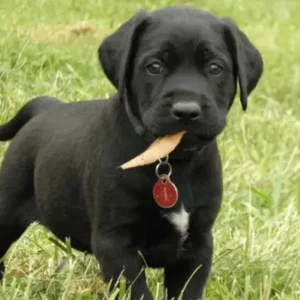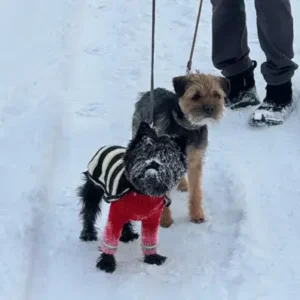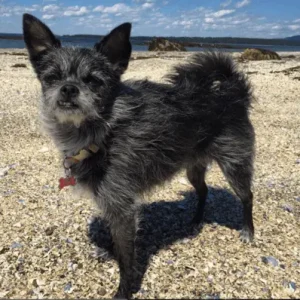Basset Retriever History/Origin
The Basset Retriever’s lineage is a fascinating tale that intertwines the histories of its parent breeds, the Golden Retriever and the Basset Hound. This breed didn’t exist for a long time.
But people started to breed them on purpose in the late 20th and early 21st centuries. They wanted to combine the good traits of Golden Retrievers and Basset Hounds. This mixing of breeds became more popular over time.
This mixed breed has a distinctive low-slung stature and exceptional scenting abilities. It traces its roots back to France. The breed was selectively bred for hunting small game. Renowned for its enduring stamina and tenacity on the trail, the Basset Hound quickly gained popularity among hunters and nobility alike.
The Basset Retriever isn’t an official breed in big kennel clubs like the AKC or UKC. But it’s recognized by Designer Breed Registries like the DBR.
Basset Retriever Personality
The Basset Retriever is one of the dog breeds known for its friendly and loving nature, making it a perfect fit for families.
They enjoy spending time with both children and adults, often engaging in lively activities like playing fetch and going for walks. While they can sometimes show stubbornness, they are quick learners with patience and consistency.
- Basset Retriever temperament
Basset Retrievers are known for their friendly and social temperament, making them excellent companions for families and other pets.
Despite their moderate size, they can thrive in smaller living spaces as long as they receive ample exercise and mental stimulation. Regular play sessions and interactive toys are crucial for their happiness and well-being.
With their intelligence, adaptability, and affectionate demeanor, Basset Retrievers make delightful companions for households seeking a loyal and loving pet.
While Basset Retrievers can make wonderful companions for the right owners, it’s essential to be aware of the potential challenges associated with this breed.
Responsible ownership, including proper training, regular veterinary care, and meeting their exercise and grooming needs. This is crucial to ensuring a happy and fulfilling relationship with your dog.
Basset Retriever Physical Appearance
Basset Golden Retriever mixes typically have a well-balanced and sturdy body structure, with a deep chest and strong legs. Their bodies mostly resemble their Basset Hound parents more because of their shorter stances.
- Size
Basset Retrievers typically fall somewhere between the medium and large size categories. They usually stand around 14 to 24 inches tall at the shoulder. Basset Retrievers’ weight is between 40 to 75 pounds.
While some individuals may lean more toward the size of a Basset Hound, others may resemble the larger frame of a Golden Retriever. However, they generally maintain a sturdy and well-proportioned build that exudes both strength and grace.
- Coat Color
Their coats can come in various colors, often reflecting the shades seen in both Basset Hounds and Golden Retrievers.
Their coats may be combinations of colors, including shades of gold, cream, brown, black, and white. Some Basset Retrievers may have a solid coat color, while others may sport distinctive markings or patterns, such as spots or patches.
Additionally, their coats are typically of medium length and density, with a soft and glossy texture.
Golden Basset Retriever- Source: aboutaryann
Fawn Basset Retriever- Source: basset_retriever
Basset Retriever Gender Differences
While there may be subtle differences in size and temperament between male and female Basset Retrievers, the variances are generally minimal.
Basset Retriever Feed/Nutrition
Proper nutrition is vital for Basset Hound Retriever mix to maintain their health, especially considering their susceptibility to obesity and joint issues due to their low-slung bodies.
Feed them high-quality dog food tailored to their needs, focusing on lean proteins, healthy carbohydrates, and essential nutrients. Avoid overfeeding and limit treats to prevent weight gain. You can also offer potatoes to your dogs as a healthy, low-calorie treat in moderation.
Providing supplements like glucosamine and chondroitin can support joint health, ensuring your Basset Retriever stays active and healthy throughout their life.
Consult your veterinarian to determine the best diet based on factors like age, weight, and activity level.
Basset Retriever Health
Basset Retrievers are generally healthy dogs, but they may be prone to certain health issues inherited from their parent breeds.
- Hip Dysplasia: Basset Retrievers are susceptible to hip dysplasia, a genetic condition where the hip joint doesn’t develop properly. This can lead to discomfort, pain, and eventually arthritis as the dog ages. It’s crucial to maintain a healthy weight and provide moderate exercise to help prevent and manage hip dysplasia
- Obesity: Due to their low-slung bodies and hearty appetites, Basset Retrievers are prone to obesity if not properly managed. Obesity can lead to a range of health issues, including joint problems, heart disease, and diabetes. To prevent obesity, it’s essential to monitor their diet, provide regular exercise, and avoid overfeeding or excessive treats.
- Canine Gastric Torsion: Bloat, also known as GDV, is a life-threatening condition that can affect Basset Retrievers. It occurs when the stomach fills with gas and twists, cutting off blood flow to the stomach and other organs.
Basset Retriever Care and Grooming
Taking care of your Basset Retriever’s coat is pretty easy, but it’s still important to do it regularly to keep them looking and feeling good. Their fur can be soft and silky, but it varies depending on their parents.
They usually are moderate shedders so weekly brushing is enough. However, during shedding season, they might require more frequent brushing. Bathing them now and then with gentle dog shampoo helps keep them clean and comfy.
Their floppy ears need attention too, as they can get infections easily. Just keep an eye on them, and if you notice any redness or bad odor, clean them gently with dog-safe ear cleaners.
By doing these simple things regularly, you’ll help your dog stay happy and healthy. Additionally, leash training your dog ensures enjoyable and controlled walks, promoting both physical and mental well-being.
Basset Retriever Rescue Groups
If you’re looking to adopt a Basset Retriever, it’s always a good option to consider rescue groups that specialize in Basset and Retriever breeds.
Basset Retriever Price
The price of a Basset Retriever typically ranges from $500 to $1,500, depending on the breeder and the dog’s lineage.
When looking to purchase a Basset Retriever puppy, make sure to buy from a reputable breeder who specializes in mixed breeds.
Interesting Facts
- Due to their mixed heritage, Basset Retrievers can have a wide range of appearances. They may have the long ears and short legs of a Basset Hound, combined with the coat and build of a Golden Retriever.
- Basset Retrievers are known for their friendly and social nature. They tend to get along well with children and other pets, making them excellent family companions.
Best For
Basset Retrievers excel as family pets and companions. Their friendly disposition and gentle nature make them well-suited for households with children and other pets.
Top Names
| Male Basset Retriever Names | Female Basset Retriever Names |
| Winston | Luna |
| Marley | Willow |
| Baxter | Rosie |
| Finnegan | Hazel |
| Duke | Ivy |









 Basset Hound- Source:
Basset Hound- Source:  Golden Retriever- Source:
Golden Retriever- Source: 

 Golden Basset Retriever- Source:
Golden Basset Retriever- Source:  Fawn Basset Retriever- Source:
Fawn Basset Retriever- Source: 







